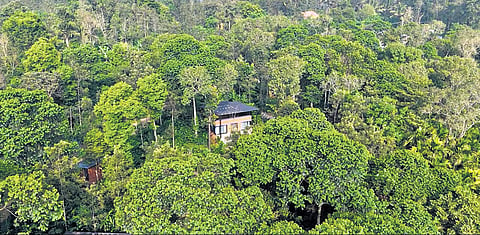

BENGALURU: Nestled in the heart of the Western Ghats lies Swasya Living, a green haven for all nature lovers.
Located at Sakleshpur, it’s a space where you can thrive, away from concrete jungles, a space which you must at some point of time crave to run away and hide in. Where only birdsongs and the smell of rain drenched soil can disrupt your senses. Swasya Living has been set up by Nijish Nair, Ashrith Begur and Avinash Begur. It is something personal--it’s a dad’s concern to raise his child in the right condition, an escape away from mechanical lives one is taught to live and a sustainable conscious mindset.
“Our managed farmland community isn’t just about land ownership; it’s about belonging to a vision where wellness, organic living, and community come together,” said Ashrith Begur. It began as a personal retreat with two rustic cottages, and soon it turned to something bigger.
“We listed it on Airbnb just to experiment,” Nijish says. “We priced it high so only those who respected the space would come.” But in just six months, they became superhosts, hosting CEOs and nature lovers alike.
Many guests were interested in managed farmlands, but most were disappointed with the existing offerings: mismanaged spaces, broken promises, and no one to turn to. “That’s when we saw an opportunity--not just to sell land, but to build a community rooted in responsibility. And thus, Swasya Living was born,” said Nijish.
Built across 40 acres of land, the farm has five eco-friendly cottages built mainly for visitors to see how the farm works. Interested individuals are welcome to come and stay at the cottages and experience the plot at free of cost, “except they will have to pay for the food which is 1,500 per person for three meals, satvik food made from everything we have procured in the farm,” he added.
Anyone can buy the plot but only at a cost. A cost which is a promise to keep the plot as greener like before. “We have 15,000 trees and If you have to build a cottage, you have to build in such a way that none of the trees are impacted, or none of the other coffee plants are impacted,” said Nijish.
“Eighty per cent of the materials have to be eco-friendly. It could be any eco-friendly material, and designs have to be approved by us and you can have only the ground floor. An attic would be fine but not big houses that would disrupt the environment.” He added: “Basically, even after 20 years we want the place to look exactly as it is right now.” “We have five acres of man-made lakes, a three-acre kitchen garden where we grow all the vegetables ourselves.” The farm is designed to grow fresh, healthy food straight from the land. Over 10,000 saplings have been planted so far, including more than 200 avocado trees, 100 jackfruit trees, over 100 coconut trees, and around 50 to 60 mango, guava and lychee trees.
A sanctuary for fresh honey
They initially started with 20 beehives and got very good results. So, they increased the number to over 100. “The farm also has five cows, which provide fresh milk, curd and ghee. “We follow organic ways strictly,” says Nijish. “Now, we are also trying to grow mushrooms. We have already harvested about 20 kilograms of mushrooms and are building a small polyhouse to grow more. Additionally we are also running on solar energy, though not entirely, we try to use as much as renewable resources as possible.”
“My personal goal is that if another wave of problems comes, we should be able to live and survive within our community. So, we are working hard to be fully sustainable,”Nijish says. With having many workers from around the village and procuring things from local village markets, Swasya living not only runs on sustainability but also on community support. “We repaired a well for the village and are taking care of the education a few kids. We are also selling the community products and giving a part of the money to the community,” he adds.
“We’ve already built a FIFA-standard football turf and the clubhouse. In the next four to six months, facilities like the infinity pool, temperature-controlled pet pool, hobbit house, beach volleyball court, spa, sauna, and more will be ready,” Nijish said. “Places like this where basics are sorted from a long-term viewpoint, will really play a huge role in the future,” said Nijish. “It’s more than an investment; it’s a return to values that matter,” concludes Ashrith.